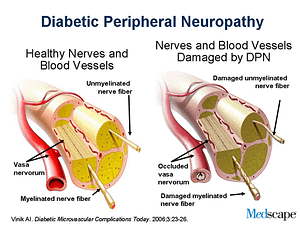Most of us associate peripheral neuropathy with diabetes. What might be a surprise is that there are three other forms of neuropathy that are also common to diabetics.
Diabetic neuropathy is the result of prolonged periods of excess glucose in the blood damaging fragile nerve fibers. Hyperglycemia also damages the walls of the many blood vessels in the body, including the capillaries that provide the blood supply that supports the nervous system. Finally, high glucose levels interfere with the ability of the nerves to send signals.
Taken together, this triad of damage causes first numbness, then extreme pain, in the nerves in various areas of the body.
Diabetic Neuropathy
 Diabetic neuropathy is a type of nerve damage that can occur if you have diabetes. High blood sugar can injure nerve fibers throughout your body, but diabetic neuropathy most often damages nerves in your legs and feet.
Diabetic neuropathy is a type of nerve damage that can occur if you have diabetes. High blood sugar can injure nerve fibers throughout your body, but diabetic neuropathy most often damages nerves in your legs and feet.
Depending on the affected nerves, symptoms of diabetic neuropathy can range from pain and numbness in your extremities to problems with your digestive system, urinary tract, blood vessels and heart. For some people, these symptoms are mild; for others, diabetic neuropathy can be painful, disabling and even fatal.
Diabetic neuropathy is a common serious complication of diabetes. Yet you can often prevent diabetic neuropathy or slow its progress with tight blood sugar control and a healthy lifestyle.
Peripheral Neuropathy
This is the most common form of neuropathy to afflict diabetics. Symptoms usually begin in the feet and legs, then move to the hands and arms. Symptoms include:
- Numbness
- Loss of pain or temperature sensation
- Tingling or burning
- Acute sensitivity to touch
- Sharp pains or cramps
- Bone and joint pain
- Muscle weakness
- Loss of reflexes, beginning with the ankle
- Loss of balance and coordination
- Acute injury to the foot, including ulcerations, infections, deformities
Autonomic Neuropathy
The autonomic nerves are the ones that control the beating of the heart, breathing, bladder control, movement of stomach contents, movement of waste through the intestines and sexual response.
These are the nerves that act without being directed by conscious thought. Symptoms include:
- Hypoglycemic unawareness (an inability to sense that blood glucose has dropped too low)
- Bladder issues (infections, retention or incontinence)
- Constipation or uncontrollable diarrhea, or both
- Gastroparesis (slowed emptying of the stomach)
- Difficulty swallowing
- Erectile dysfunction
- Sexual difficulties in women
- Increased or decreased sweating
- Problems regulating body temperature
- Changes in way eyes adjust when changing from light to dark
- Increased heart rate when at rest
- Loss of the body’s ability to adjust blood pressure and heart rate
By Susan Renzo
08/29/2015
Continue reading the full article from Information About Diabetes here
 Skip to content
Skip to content
